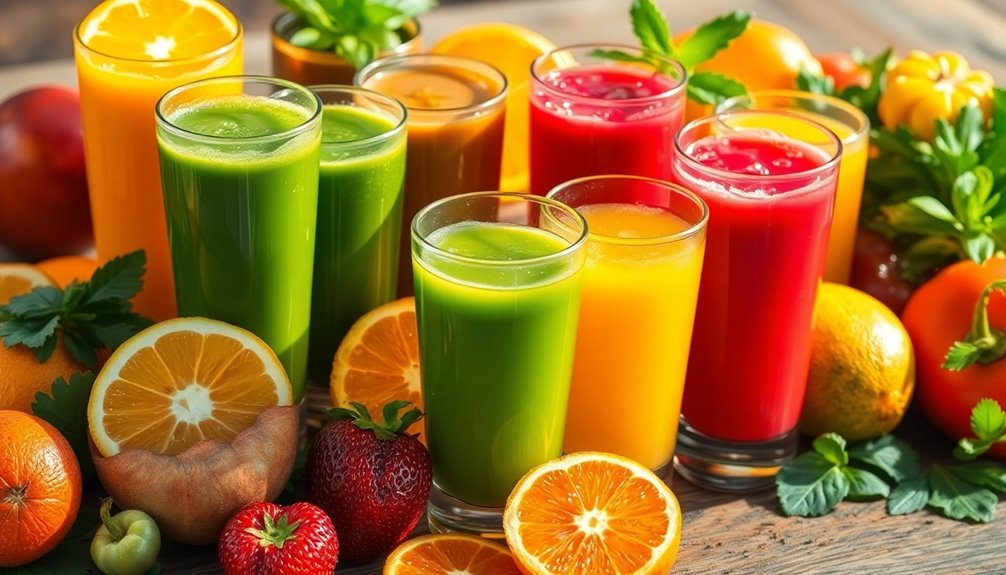Freshly squeezed juices are packed with essential nutrients, averaging 50 to 200 calories per cup, mostly from carbohydrates. They're low in protein and fat-free, offering high amounts of vitamin C and potassium. Juices provide quick hydration and energy, but keep an eye on sugar levels and consume mindfully, ideally with meals to protect your teeth. Balancing juices with whole fruits supports digestion and overall health. Discover more insights on how to enjoy these nutritious delights!
Key Takeaways
- Freshly squeezed juices range from 50 to 200 calories per cup and are high in carbohydrates, averaging 20-30 grams.
- These juices are low in protein, typically under 2 grams, and are mostly fat-free, except for avocado juice.
- Rich in vitamin C and potassium, freshly squeezed juices provide antioxidants that protect cells from damage.
- Juices lack fiber found in whole fruits, which may affect blood sugar regulation despite having higher bioavailability for some nutrients.
- UK guidelines recommend limiting juice intake to 150ml per day due to high sugar content and potential for rapid blood sugar spikes.
Nutritional Overview of Freshly Squeezed Juices
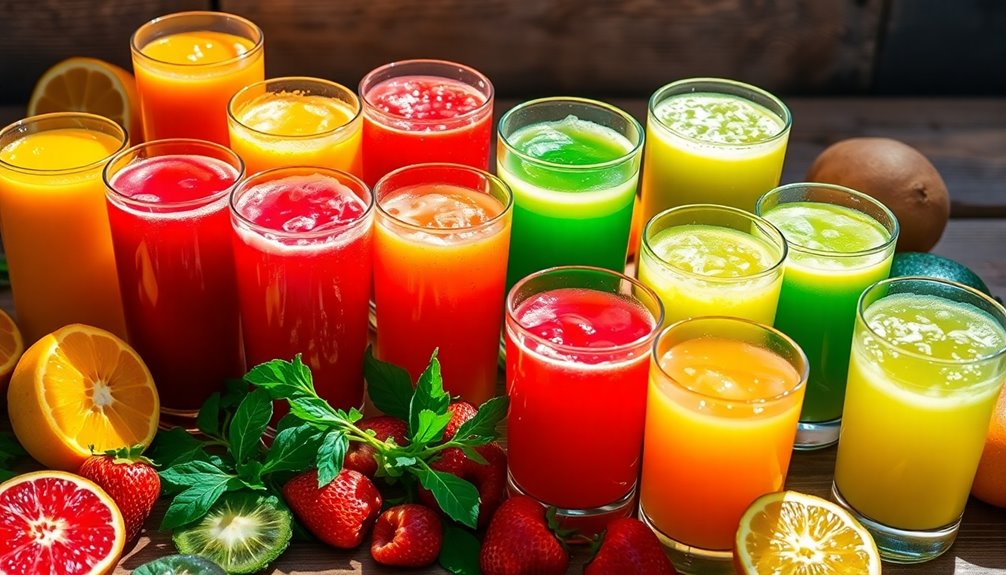
When considering the nutritional overview of freshly squeezed juices, it’s important to understand their macronutrient and micronutrient profiles. Freshly squeezed juices are often rich in vitamins, particularly vitamin C, which supports immune function and skin health. Additionally, they provide essential minerals such as potassium and magnesium that contribute to overall wellbeing. Understanding the nutrient value of fresh juices can help consumers make informed choices about incorporating these beverages into their diets to enhance their nutritional intake effectively. Moreover, the hydration provided by freshly squeezed juices cannot be overlooked, as they help maintain fluid balance in the body. These beverages not only offer a convenient way to increase fruit and vegetable intake but also come with a host of freshly squeezed juice benefits, including improved digestion and antioxidant properties. Incorporating a variety of freshly squeezed juices into your daily routine can lead to enhanced energy levels and overall vitality.
Freshly squeezed juices typically range from 50 to 200 calories per cup, largely depending on the fruit. Most juices are high in carbohydrates, averaging 20-30 grams per cup, but they often lack fiber due to the juicing process. Additionally, store-bought orange juice may have reduced vitamin C compared to freshly squeezed options.
You'll find that protein content is generally low, usually under 2 grams, and most juices are fat-free, with avocado juice being a notable exception.
Micronutrients also play a role; many juices are rich in vitamin C and potassium.
Freshly squeezed juices are best consumed immediately to maximize their nutrient content and flavor, especially when compared to commercial options.
Health Benefits of Freshly Squeezed Juices
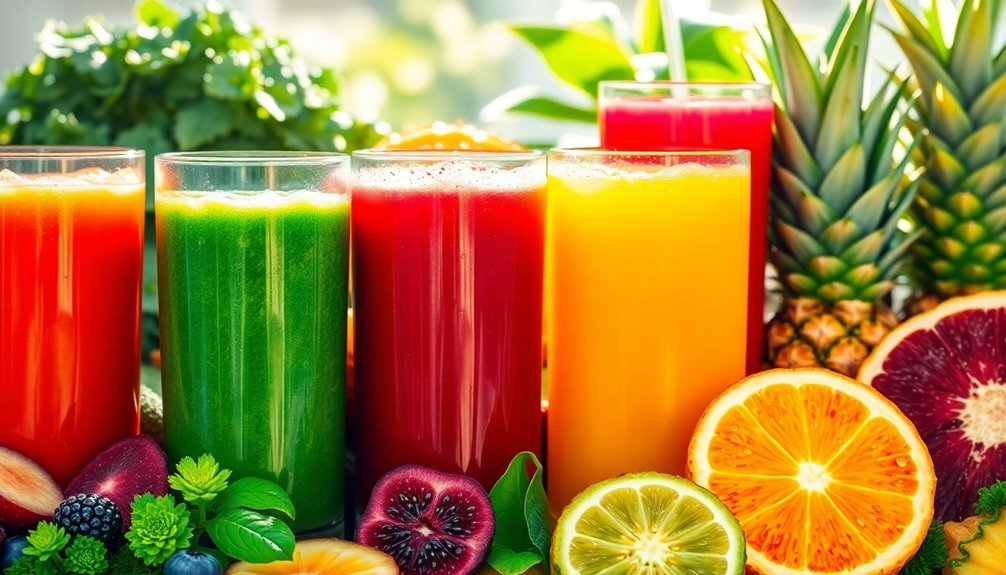
Freshly squeezed juices not only provide a range of nutrients but also offer numerous health benefits that can enhance your overall well-being. They aid digestion by supplying vitamins and soluble fiber, promoting good bacteria and efficient food processing. Juices are rich in antioxidants, protecting your cells from damage and supporting your immune system with vitamin C. Additionally, these juices provide more fiber, which helps regulate blood sugar levels and lowers cholesterol. Staying hydrated with these juices boosts energy levels and helps maintain skin health. Additionally, the nutrients found in fresh juices can lower heart disease risk and contribute to weight management, while juices rich in vitamins A, C, and E promote skin health.
Comparing Freshly Squeezed Juices to Whole Fruits
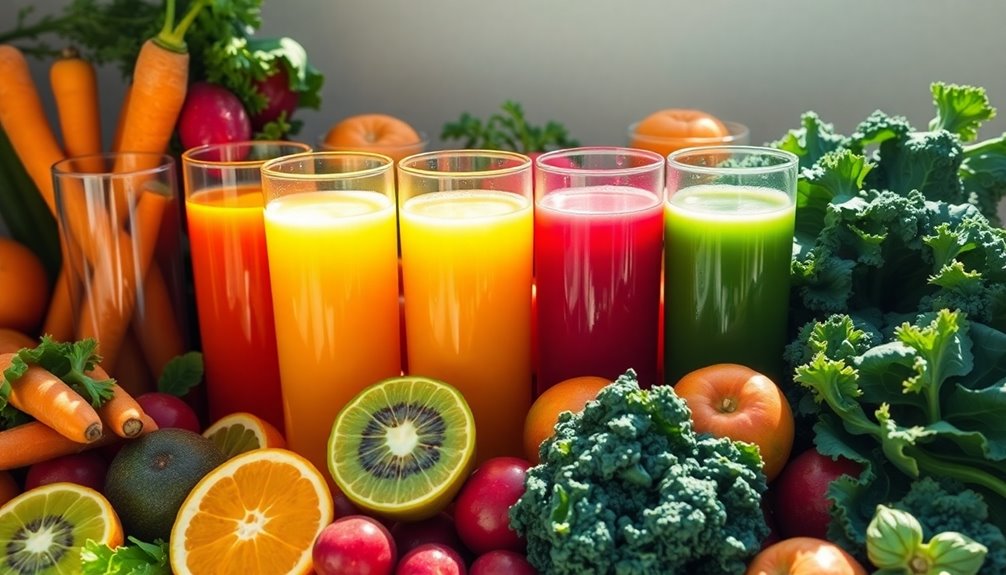
While both freshly squeezed juices and whole fruits offer nutritional benefits, their differences can significantly impact your health.
Whole fruits provide more fiber, which helps with digestion and keeps you feeling full longer. Fresh juices might have higher bioavailability for some nutrients, but they lack the fiber and phytonutrients found in the skin and pulp of fruits. This means you're missing out on important disease-preventing properties. Additionally, consuming whole fruits helps regulate blood sugar better than juice, which can lead to spikes. Juices may be convenient and hydrating, but they shouldn't replace whole fruits in your diet. Whole fruits and vegetables are a healthier choice due to higher nutrient and fibre content, so for optimal health, aim to enjoy both, prioritizing whole fruits for their comprehensive benefits.
Common Types of Freshly Squeezed Juices

Exploring the world of freshly squeezed juices reveals a variety of options that cater to different tastes and nutritional needs. You might enjoy the classic orange juice, packed with vitamin C, or the tart grapefruit juice, great for weight management. Fresh juices generally have the highest concentration of vitamins compared to other types of juice. For a sweet choice, apple juice is popular with kids, though it's lower in fiber. Grape juice offers a rich flavor, while pineapple juice boasts a tropical twist with added nutrients. On the vegetable side, carrot juice shines with vitamin A, and beet juice is noted for its blood pressure benefits. Don't forget blended options like Citrus Splash or exotic choices like pomegranate juice, each bringing unique flavors and health benefits to your table.
Nutritional Variability in Fruit Juices
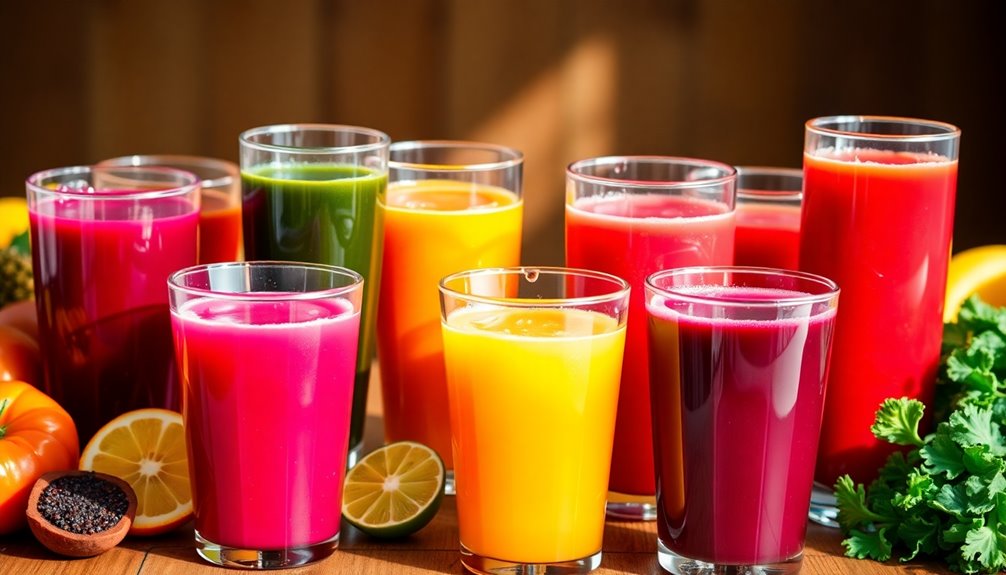
When you choose a freshly squeezed juice, the nutritional content can vary significantly depending on the type of fruit used. Citrus fruits like oranges and lemons pack a punch of vitamin C, while other fruits may offer different vitamin and mineral profiles. You'll find that juices typically contain 16–24 grams of sugar per 200 ml, impacting your overall sugar intake. Some juices retain beneficial phytochemicals and antioxidants, but their levels fluctuate based on the fruit type. Unlike whole fruits, most juices lack fiber, which can affect satiety. Therefore, it's essential to consider these factors when enjoying your juice, ensuring you reap the benefits while being mindful of potential drawbacks. Moderate consumption of 100% FVJ can provide cardiovascular benefits without increasing the risk of type 2 diabetes or cardiovascular disease. Additionally, some juices may also contain antioxidants that help combat oxidative stress, enhancing your overall health.
Dietary Considerations for Freshly Squeezed Juices

Considering the high sugar content and lack of fiber in freshly squeezed juices, it's important to approach them mindfully as part of your diet. UK guidelines recommend limiting your intake to no more than 150ml per day. While juices can provide quick nutrient absorption, the natural sugars can cause rapid spikes in blood sugar levels, which isn't ideal for everyone, especially those managing diabetes. Moreover, the acidity in juices can erode tooth enamel, so drinking them with meals can help mitigate this effect. It's also crucial to remember that juice offers no nutritional benefits over whole fruits for children over 6 months. Additionally, whole fruits provide fiber, which aids in digestion and promotes satiety. Remember, moderation is key; excessive juice consumption can contribute to weight gain and nutrient deficiencies, particularly in children. Incorporate juices into a varied diet to balance your overall nutrition effectively.
Tips for Choosing Healthier Juice Options
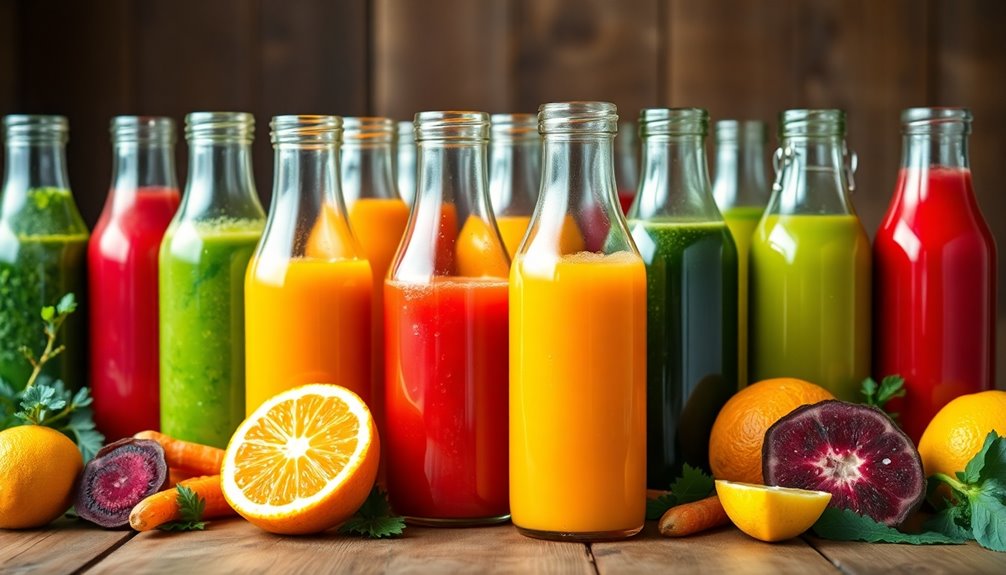
Choosing healthier juice options can greatly enhance your nutrient intake while minimizing excess sugars and calories.
Start by opting for 100% juice, avoiding juice cocktails that often contain added sugars. Check ingredient lists to ensure the primary ingredient is your chosen fruit or vegetable, steering clear of fillers like apple juice.
Look for juices with no added sugars to keep calorie counts down. Consider organic varieties, as they might've higher antioxidant levels and provide more nutrients. Juices like parsley juice are not only nutritious but also offer various health benefits.
Focus on nutrient-dense juices, such as beet or tart cherry juice, which offer specific health benefits.
If you're concerned about sugar, dilute your juice with water, and remember to consume in moderation as part of a balanced diet.
How to Incorporate Freshly Squeezed Juices Into Your Diet
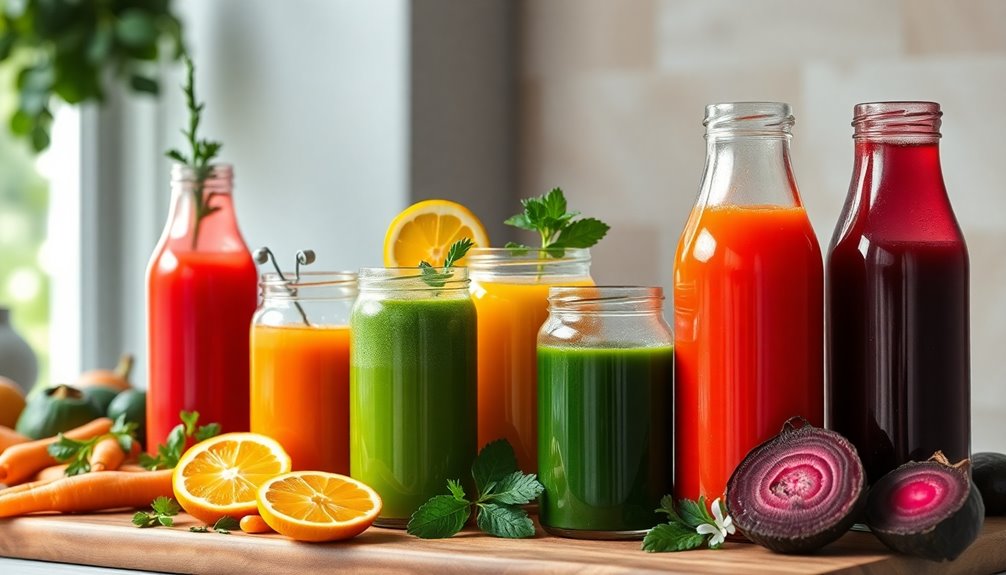
Incorporating freshly squeezed juices into your diet can be a delicious way to boost your nutrient intake and energy levels. Start your mornings with a refreshing juice to kickstart your metabolism and energize your day. Fresh juices can also replace processed snacks with juice for a nutrient-packed alternative that helps manage calorie intake. If you're hitting the gym, sip on a juice before your workout for hydration and quick energy, as customization allows for tailored health benefits.
Planning a weekly juice menu can simplify grocery shopping while ensuring variety. Remember to balance your juices with whole foods to maintain fiber intake and overall nutrition. This approach not only enhances your diet but also supports your digestive health and overall well-being. Enjoy the vibrant flavors and health benefits!
Frequently Asked Questions
Can Freshly Squeezed Juices Replace Whole Fruits in My Diet?
Freshly squeezed juices can't fully replace whole fruits in your diet.
While they offer some vitamins, they lack the fiber and nutrients found in the pulp and skin of whole fruits. Whole fruits help regulate blood sugar, aid digestion, and keep you feeling full longer.
If you enjoy juice, consider it a supplement rather than a substitute, and aim for moderation to maintain a balanced, nutrient-rich diet.
How Long Do Freshly Squeezed Juices Last in the Refrigerator?
Freshly squeezed juices can last up to 72 hours in the refrigerator if you store them properly, but for the best flavor and nutrients, try to consume them within 24-48 hours.
Keep your juices in airtight glass containers to minimize air exposure and refrigerate them at 35-40°F (1.6-4.4°C).
Are There Any Risks Associated With Excessive Juice Consumption?
Did you know that consuming just 12 ounces of fruit juice can provide more sugar than a can of soda?
Excessive juice consumption can lead to health risks like obesity, heart disease, and type 2 diabetes. It also displaces more nutritious foods, causing nutrient deficiencies.
Additionally, high sugar content contributes to tooth decay.
To stay healthy, limit your juice intake and prioritize whole fruits and water for hydration.
Can I Use a Blender Instead of a Juicer for Juice?
Yes, you can use a blender instead of a juicer for juice, but there are some key differences.
A blender retains all the fiber, resulting in a thicker drink, while a juicer extracts pure juice, leaving out the pulp.
If you prefer a juice-like consistency, you'll need to strain the blended mixture.
Keep in mind that blending may introduce air, which can affect nutrient retention, so consume it fresh for the best benefits.
What Are the Best Fruits for Making Low-Sugar Juices?
Making low-sugar juices is like crafting a refreshing breeze on a hot day.
You'll want to use fruits like cucumbers, lemons, and watermelons, which keep sugar levels in check while delivering vitamins. Guavas and grapefruits are also great choices, being low in sugar and high in nutrients.
Mixing in some leafy greens can enhance the nutritional profile without adding sweetness.
Conclusion
Incorporating freshly squeezed juices into your diet is like adding vibrant colors to a canvas, enhancing the masterpiece of your health. Each sip bursts with nutrients, painting your body with energy and vitality. Remember, balance is key—juices can complement whole fruits but can't replace them. So, as you swirl these liquid gems into your daily routine, you nourish your body and invigorate your spirit, creating a beautiful blend of wellness that's uniquely yours.
Cindy thoroughly researches juicing trends, techniques, and recipes to provide readers with practical advice and inspiration. Her writing style is accessible, engaging, and designed to make complex concepts easy to understand. Cindy’s dedication to promoting the advantages of juicing shines through her work, empowering readers to make positive changes in their lives through the simple act of juicing.

